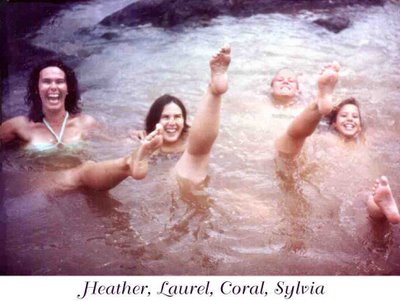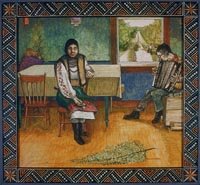Today I browsed “Baha’i” blogs. I found some very informative ones, including the exceptional “Baha’i Views”, and also found that some of them had linked to mine (thank you). I was also interested in finding a few that were semi-official representatives of their respective communities, and several which had disclaimers referring the reader to the official Baha’i source at www.bahai.org/, which I thought was intelligent.
I also found several sites from folks following other religious traditions, some intrigued, some the standard attempts at de-bunking Baha’i theology (often written without any genuine study and just repeating the tired critique of past hearsay and suspicions), some discussing Baha’u’llah in the context of their own traditions, and some simply ranting. Some were from disgruntled Baha’is themselves (either from “within” the faith, or outside of it). For them, my tendency is to ask them to read a document which I regard as essential, the letter from the Universal House of Justice, 1988, on individual rights and freedoms. Or not.
Other sites consisted of stream-0f-consciousness speculations, various forms of apologetics or information-based blogs, and of course, some simply mentioned the Baha’is en passant, having visited a temple, perhaps, or encountered a Baha’i meeting.
The tenor of the blogs reminded me forcibly of a couple of areas about which I have often reflected in my Baha’i life (which has been a roller-coaster in the amusement park we call certitude). While born into a generational Baha’i family (and thus being somewhat anomalous in North America), I, perhaps like any other Baha’i, have continually had to come to terms with my beliefs and the implications of their practice. This process surely means lifelong spiritual struggle, which is, however, often combined with spiritual confirmations. It means, to me, learning to have a life in prayer and meditation, coupled with the busy reality that is our North American lifestyle of materialism. But it also has meant a repeated need for analysis of what I view as the most challenging component of faith encountered by the western mind: obedience.
I think it is probable that people coming from Muslim backgrounds tend to understand the concept of submission more than most from the more secular countries, where the division of ‘church’ and state is more apparent. This is just a guess. It is also my perception that most of the Christian friends I encounter, if they practice, believe in a fairly ‘soft’ form of religion where one is not accountable (witness the vast numbers of Catholics who are probably not overly familiar with Papal doctrines on such items as birth control or abortion, and if they did know the official dicta, would find such tenets anachronistic at best and toxic at worst.) But my impression is that many self-declared Baha’is conflate “what I want” and “what the Faith should be”. To risk a gross generalization, we are attracted to the light, as long as it doesn’t mean we have to allow it to shine on us. Passive faith is so much easier, in some ways…and it is more comfortable to whine about the externals than to truly bring oneself to daily account. Another guess.
The question, for me, is one of authority. To be a Baha’i is to be a person who, by act of volition, or choice, accepts the claims of Baha’u’llah, and as a component of that ‘Covenant’, agrees to try to abide by the laws of the religion. No one requires anyone to become a Baha’i. This is simply a fact, although I’ve heard all kinds of stories about pressuring parents or friends (perception is everything). However, the simple truth is that if you want to be a Baha’i, you declare yourself so and then you proceed through your life accordingly…or not…and if you vote to leave with your feet, no one is going to chase you down the road waving tracts in your face. You are responsible for your own state of faith, as Baha’u’llah says quite succinctly:
“The faith of no man is conditioned by anyone except himself.” (from a Tablet which has been provisionally translated) and which you can find at Baha’i Library Online.
So you choose to be a Baha’i, and then you have to try and abide by laws. These are sometimes quite apparent (non-drinking/drugging, chastity, avoiding backbiting….the so-called ‘visible sins’), and are sometimes more obscure (whether you Fast, or not, whether you say your Obligatory Prayer, or not…) but are still, unless you are blatant in disobedience, essentially a part of your private relationship with God. To be a Baha’i can be a bit of a challenge, because sometimes Baha’u’llah’s teachings simply do not accord with the popular culture’s assumptions (whether it is a widespread acceptance of alcohol, as in North America, or a widespread acceptance of misogyny, everywhere, or any number of possible socially controversial topics...not for me to discuss, at least today). Many people find themselves having to work out, in their own minds why the faith says one thing or another, and this creates a sense of discomfort, of self-questioning. I do not think that it is coincidence that in one of the most significant Baha’i prayers, the Tablet of Ahmad, Baha’u’llah directs us “Be not of those who doubt.” He expected us to doubt, and offered warning, or perhaps it would be better to say, a strongly worded suggestion!
I think what is critical is that we continue, all of our lives, to ask questions, but to understand from what context we do so: Baha’u’llah, if he really is who he says he is, does have the right to mandate. He does have the right to change social practice, and he does have the right to say, “This is wrong” or “This is right.” I see him truly as a wise father: it is his son, ‘Abdu’l-Baha, who mediates and helps us understand what obedience to the sometimes very difficult precepts mean.
This religion is more than just about principles, or social change; Baha’is often tend to be nice people, or at least idealistic ones, and often are benignly interested in the cultures in which they live (although that generalization, I realize, is again based in my life in North America). So many of us here decry the evils of materialism while living them, decry the frustrations of having to accept things we don’t always understand, or act, indeed, as rebellious adolescents. Others are more able to internalize, as a part of the development of spiritual process in their lives, that the whole is more than the sum of its parts, to grasp the broader picture and not get stuck in shooting ourselves in our own feet (if you will forgive the cliché). This is a religion of personal transformation (which often hurts), coupled with social action (which often requires a great deal of energy), and added to all of that is the overarching reality is that we are meant to love (genuinely) people in whom, in ordinary circumstances, we would have no interest at all, and even quite possibly despise.
Baha’u’llah doesn’t need Baha’is, or anyone else, to agree with him. Neither did Christ (who understood perfectly well why he was placed on that cross)…or Muhammad (who knew perfectly well what he was doing and why) or Buddha. What the practitioners of any religion need to do is to understand that they are embarked in a lifelong project, the progress of their soul towards God, and that sometimes, this will be uncomfortable and will not ‘agree’ with their cultural surroundings or their ‘intellectual dissonance’. It is not Baha’u’llah’s job to conform to the expectations of the people. Nor, if we believe, does it mean uncritical acceptance or blind faith. We must continue, all our lives, to ask questions about our beliefs, and to try and contextualize the uncomfortable issues along with the things that made us happy about the faith in the first place. Within this, it is critical that we look to the source. I believe it is our responsibility to become scholars, advocates, and “loyal adherents”; to come alive with acting, every day of our lives, with the loving and generous aspects of lives where we have deliberately chosen a mystical path, to be followed through in practical circumstances.
In his 1998 paper, LeRoy Jones quotes one of my favourite passages:
Shoghi Effendi stated that " the core of religious faith is that mystic feeling which unites Man with God." (Directives of the Guardian, p. 86) He goes on to say in this passage that "The Bahá'í Faith, like all other Divine Religions, is thus fundamentally mystic in character. Its chief goal is the development of the individual and society." He puts the development of the individual and society within the context of religion that is not only fundamentally mystic, but the mystic feeling is at its very core.
I like this because I think that the synthesis of mystic truth with everyday practice is the core of unity. The ability to feel our soul, to change our soul, to connect with our spirit; this is the reason to be alive. Faith is not about dogma; it is about this alive connection to our own core, and the corollary intimacy with all the other souls on the planet, and indeed in the next world. It’s…mind-boggling…and it’s way beyond trivial complaints about personal satisfaction. When we really understand obedience, when we really understand search, and when we really understand love…perhaps we will begin to sense what it is we are engaged in as Baha’is. It’s not meant to be fun, or entertaining; you want fun, go to the movies. We do come from a culture where complaint and blame are almost second nature, so it’s challenging to pull ourselves out of that morass. It’s easy to fall into apportioning our troubles to something external, so as long as faith remains “out there” as an abstraction, or something we choose for simplistic reasons. As such, we become ripe for our own limited perceptions to take hold. Faith is meant to be one of personal transformation and ultimately the means for the unification of the globe. This is a truth deserving of deep study and unhesitating participation in community life and a certain joy, which will give us “wings.”
At this point in my life, faith excites me more each day, in a quiet kind of way. I hope this feeling endures. I also feel quite shy about saying this publicly, but after reading blogs this morning, I felt as though this shining gift in my life was perhaps something I should stand up for more strongly. This is me, standing up.
That’s my little rant for today, for what it’s worth. Let me conclude: these views are mine and only mine. For those of you who read this who really want to know about the Baha’i faith, go to www.bahai.org or any of several Baha’i libraries online or find books in your community or locate a Ruhi circle or a fireside or a deepening or however you need to learn, and read the words of Baha’u’llah and ‘Abdu’l-Baha, because they’re the only ones who really know. Whatever the Baha’is say, it’s only commentary.
I am deeply grateful for the patient understanding of the All-Merciful Lord.














